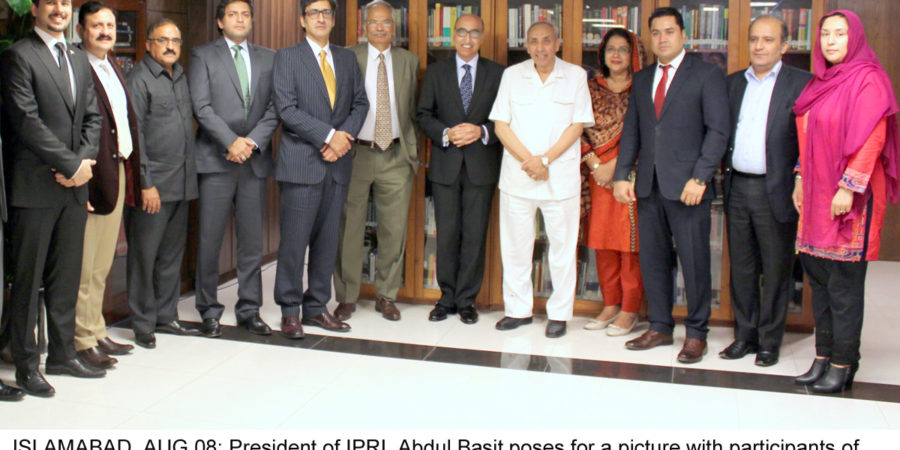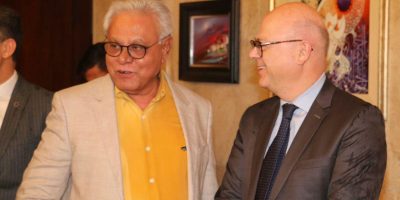One-Day IPRI Workshop on “Human Rights Violations in Indian Occupied Kashmir” held in Islamabad

ISLAMABAD, AUG 08: It is not just the responsibility of the international community to find a solution to the Kashmir issue, Pakistan also needs to be consistent in its support of Kashmiris’ fundamental rights and their struggle. For this, synergies need to be created between public policy officials and academia to highlight this issue collectively.
This was the unanimous consensus of the speakers and participants of the one-day workshop organized by the Islamabad Policy Research Institute on “Human Rights Violations in Indian Occupied Kashmir (IOK): Kashmiri Aspirations and Responsibility of International Community” held here in Islamabad today.
It was stressed that the moral conscience of the international community also needs to be brought to life because there can be no durable peace in the subcontinent unless Kashmiris’ right to life and their basic human rights are sanctified and protected.
In her presentation on “Indian Occupied Kashmir (IOK): A Human Tragedy”, Dr. Amna Mahmood, Professor, Department of Politics and International Relations from the International Islamic University, Islamabad gave a brief background of Kashmir’s historical legacy and shared that capturing the towns of Gurdaspur and Ferozpur enabled the Indian military to enter the princely state of Kashmir.
She provided stark statistics outlining the unprecedented suppression by the Indian government in the occupied Valley. Unmarked graves found in the Valley in August 2011 were reported to be as high as 6700, with 10,000 missing persons reported over the past 20 years. Informing the audience of the post-Burhan Wani security situation in IOK, she informed that more than a 100 people have been killed, with 8587 arrested, and more than 15,000 injured since 2016.
She remarked that American officials have evidence of widespread torture by Indian police and security forces and were secretly briefed by Red Cross staff about the systematic abuse of detainees in Kashmir, according to leaked diplomatic cables.
In fact, a 2016 country report on human rights practices from the US State Department stated that there are “most significant human rights problems in India,” and that “lack of accountability for misconduct at all levels of government” persists in the country, “contributing to widespread impunity,” she quoted.
Mr. Ahmad Nazir Warraich, an international law expert discussed the legal anomalies surrounding IOK. He explained at length the term “international law” as a set of rules that countries follow in dealing with each other. However, he clarified that this basic definition must be supplemented with three more complex explanations such as, is international law really law, the way the laws of Pakistan, enforced by courts and police, are? Where do we find the rules of international law? Are they written down somewhere? Finally, how is international law enforced, if there is no world government? He explained that while there is no overall authority to force compliance with the international rules viz-a-viz human rights in particular, that does not necessarily mean that there is no law. International law is “real law” but with different characteristics from the law practiced in domestic settings, where there is a legislature, judiciary, executive, and police force. “While, there can be significant difficulty in establishing exactly what international law is, various sources, principally treaties between states are considered authoritative statements of international law. Treaties are the strongest and most binding type because they represent consensual agreements between the countries who sign them,” he explained.
He stressed that self-determination is a core principle of international law, arising from customary international law, and also recognised as a general principle of law, and enshrined in a number of international treaties. For instance, self-determination is protected in the United Nations Charter and the International Covenant on Civil and Political Rights as a right of “all peoples” to which India is a signatory.
Major General (R) Hafiz Masroor Ahmed, Vice President, Centre for Global and Strategic Studies, Islamabad spoke about the responsibility of international community towards the Kashmiris. He said that situation prevailing in IOK is similar to that prevalent in Libya in 2011 when the UN Security Council promptly passed the resolution authorising use of force against Qaddafi’s regime under the garb of humanitarian intervention. “Why did they go to that extent in Libya and were so keen to intervene in Syria, but they are not doing anything to support the oppressed people of IOK?” he probed. Since security situation in IOK has no particular impact on leading powers of the world, they have no vested interest in Kashmir, he argued.
Kashmir issue is getting “out of fashion” in Pakistan because our commitment to the cause has gradually decreased, he said. A defeatist mind-set is taking root while Kashmiris are fighting with Pakistani flags in their hands. Pakistan needs to reinvigorate its support of their cause with a more comprehensive policy, he urged.
Dr. Syed Rifaat Hussain, Professor Development Studies, School of Social Sciences and Humanities (S3H), National University of Science and Technology (NUST), Islamabad pointed out several reasons why India has been able to keep the world’s attention away from its gross human rights violations in Kashmir: one, the political economy factor, India’s sheer size and it becoming the second largest economy by 2030 ensures that the corporate world of North America keeps India happy; two, India’s projection of itself as a responsible state is well-financed, and hence, very successful; three, in the prevailing international environment, India has been able to discredit the Kashmir struggle as a just cause. As for what Pakistan can do, he urged that Pakistan has to be consistent in its support of Kashmiris’ fundamental rights as once a year solidarity day is not enough. According to Dr Hussain, “moral anger is often the key vehicle to bring about change in any society, and this moral anger needs to be extended to what is happening in IOK.”
Dr. Mujeeb Afzal from the Quaid-e- Azam University, Islamabad pointed out that the international community sees issues such as Kashmir from the power and culture lens and through this lens Kashmir is seen as a “third world Muslim issue”, one which they see no incentive in resolving since it is irrelevant to them despite this being an issue between nuclear states.
He was pessimistic that given how the international discourse is under transformation with the West looking more and more inward, there is little hope that this issue will find the light of day at the global scene.
Kashmiris are seen as secessionists, rather than as Indian nationals and because of this loyalty syndrome, even within India Kashmir is seen as an issue of integration and not one of self-determination.
According to Mr. Masood-ur- Rehman Khattak from the International Islamic University, Kashmir is the most neglected issue in the contemporary world because the US and Europe have immense economic interests in India. The Indo-US deal and their multi-billion dollar defence trade prevents the US and European Union from taking any strong position on Kashmir.
Mr. Jamal Aziz, Executive Director, Research Society of International Law (RSIL), Islamabad, said that throughout the subcontinent’s brief history, India has been shifting its position on Kashmir. He was of the view that the Kashmir issue has lost traction in the international community, despite Pakistan being on the right side. Dr. Ahmed Ijaz Malik from Quaid-e- Azam University also shared his views on the topic.
The workshop was chaired by Professor Dr. Pervaiz Iqbal Cheema, Dean Faculty of Contemporary Studies at the National Defence University in Islamabad, who urged that “Pakistanis need to mobilizse their internal strength before seeking to mobilise the international community for resolution of Kashmir dispute.”
During the interactive Q/A session, participants also stressed that Kashmir does not need freedom fighters from Pakistan, rather it needs freedom writers, freedom academics, and freedom bloggers. Pakistan needs to make intellectual investments in Kashmir’s youth by offering more scholarships and hosting greater number of students from the region at local schools and universities.
Earlier, the President of IPRI, Ambassador (R) Abdul Basit welcomed the speakers and participants to the workshop and hoped that the deliberations would lead to improved understanding of the issue and help create synergies towards finding a durable and peaceful resolution for the people of Kashmir.=DNA
==============
Related News

MANGO FESTIVAL DELIGHTS ANKARA WITH A TASTE OF PAKISTAN’S FINEST MANGOES
ANKARA, JULY 19 (DNA):The Embassy of Pakistan in Ankara today hosted Pakistan Mango Festival, offeringRead More

Parliamentary Secretary Saba vows zero-tolerance policy on gender-based crimes
ISLAMABAD, Jul 17 (APP/DNA):Parliamentary Secretary for Human Rights, Saba Sadiq, on Thursday reiterated her government’sRead More


Comments are Closed